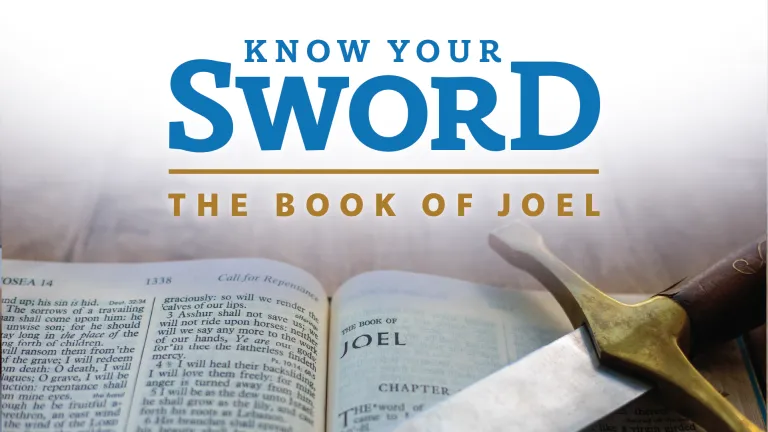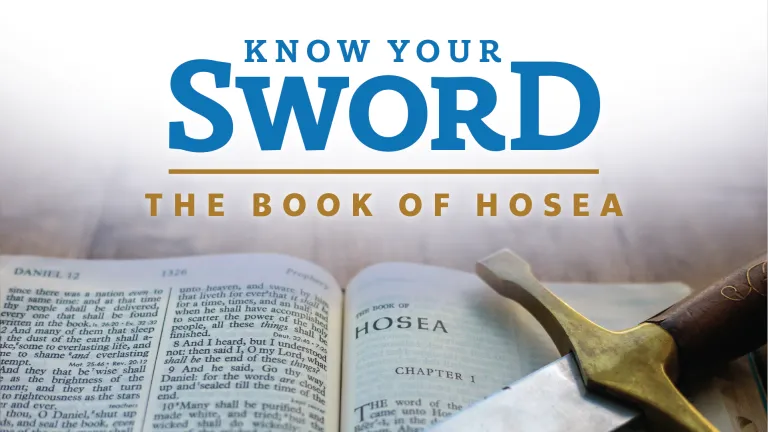Joel Part 05

Then, after God’s people truly repent, Joel 2:18-19 says, “Then the Lord will be zealous for His land, and pity His people. The Lord will answer and say to His people, ‘Behold, I will send you grain and new wine and oil, and you will be satisfied by them; I will no longer make you a reproach among the nations.’”
We continue reading in Joel 2 the description of events described as the Day of the Lord, where God will bring destruction on the earth and mankind as a demonstration of His power and punishment for ignoring Him and His commands. There is hope at the end of the book that God will restore the land and the people.
Joel 2:14 offers some hope that God will relent from causing harm. God might even restore the food supply—such that the meat and drink offerings described as “cut off” in 1:13 can be restored. In Jewish culture, food is often referred to as “a blessing.” This is a perfect example!
In Joel 2:15 we can notice the parallel with 2:1, only here in verse 15 the trumpet is to call an assembly instead of to warn of war. Numbers 10:1–4 describes how to make two silver trumpets, with different calls for assembly or movement. Numbers 10:9-10 explains the trumpet could sound for war or for the beginning of a month or a festival. Here, the trumpet is to be in Zion, which may mean the Church as we discussed in a previous lesson. If there is repentance and seeking God, then instead of an alarm for war there will be a call to worship.
Joel 2:16 emphasizes that everyone must come—young and old, men and women, even newlyweds who would normally be excluded from civic duties. No one is exempt from this sacred assembly.
Joel 2:17 speaks of intercession between the porch and the altar which means within the temple grounds. This verse is comparable with Ezekiel 8:16, where 25 men were between the porch and the altar, with backs toward God and worshiping the sun! In contrast, God’s true ministers will be in His spiritual temple, the Church, praying for God’s people (2 Corinthians 3:16)! This is intercessory prayer, and it is NOT too late. The ministers cry, “Why should they say . . . ‘Where is their God?’” Psalm 34:18 reassures, “The LORD is near to those who have a broken heart.”
Then, after God’s people truly repent, Joel 2:18–19 says,
“Then the Lord will be zealous for His land, and pity His people. The Lord will answer and say to His people, ‘Behold, I will send you grain and new wine and oil, and you will be satisfied by them; I will no longer make you a reproach among the nations.’”
Joel 2:20 refers to the northern army—a locust plague, as a type. Historically, Assyrians and Babylonians came from the north (Jeremiah 4:6; 13:20; 51:48; Ezekiel 26:7). So will the King of the North (Daniel 11:40), and even Gog and Magog (Ezekiel 38). But God can overcome any of these!
Isaiah 37:29 says,
“Therefore I will put My hook in your nose and My bridle in your lips, and I will turn you back by the way which you came.”
The East Sea refers to the Dead Sea; the Utmost Sea to the Mediterranean. Scholars note that the phrase, “stench will come up” could be from a great swarm of locusts, driven into the desert to die quickly and then rot, which would cause a terrible stench. And, so much more, the dead bodies of men. God calls birds and beasts to eat the dead bodies (Revelation 19:17-18).
Verses 21 and 22 look ahead to the Millennium, when there will be no need for fear! Jeremiah 30:10 and Ezekiel 34:28 support this hope.
Micah 4:4 says,
“Everyone shall sit under his vine and under his fig tree, and no one shall make them afraid.”
Joel 2:23–24 shows that God provides rain: the former and the latter (Jeremiah 5:24; Hosea 6:3). This is part of the blessing for obedience (Deuteronomy 28:1–5; 28:12). Drought, by contrast, is a curse for disobedience (Deuteronomy 28:23–24). With punishments removed, food will become plentiful.
In verse 25 the types of locust (or developmental stages) are in a different order from 1:4, but it does call them “My great army.” Again, we ask, was the locust plague a type of an actual invasion? Both insect swarms and human armies could be used by God for His purposes. God has power over all creatures, the weather, the timing of events and humans.
Minor Prophets class is taught at ABC by Dr. Frank Dunkle.
UYA Team | uya@ucg.org
United Young Adults (UYA) primarily serves the 18–32-year age group for the United Church of God. There are three main areas of contribution to the lives of the young adults: Promoting Spiritual Growth, Developing Meaningful Relationships and Making the Most of Your Talents. The Know Your Sword series is a daily expository message introducing God’s Word from a trusted perspective.


